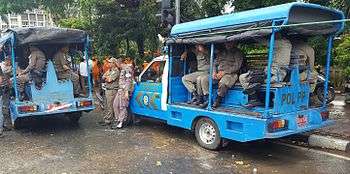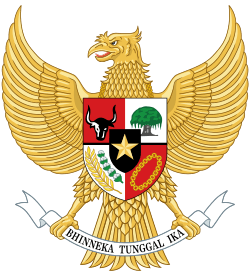Civil Service Police Unit
|
Logo of the Civil Service Police Unit (Municipal police) of Indonesia | |
| Agency overview | |
|---|---|
| Formed | 3 March 1950 |
| Jurisdiction |
|
| Motto | Praja Wibhawa |
| Minister responsible |
|

The Civil Service Police Unit, or in Indonesian known as Satuan Polisi Pamong Praja (Satpol PP), is the Municipal police unit of Indonesia which is under the auspices of the local government and is operated by the Department of Home Affairs. The Civil Service Police Unit (Satpol PP) duties are to assist the local regional head (municipal, city and/or provincial) of the government affairs in the field of Security and Public order which is to enforce regulations of the region. This force is under the Ministry of Home Affairs.
The Civil Service Police Unit (Satpol PP) are different from the Indonesian National Police (POLRI). The Indonesian National Police or POLRI duties are to enforce law, protection and security services for the citizen, investigation and prevention of crime, crowd control in cases of public disturbances and social deviations of an area (city, province/special region, and country), response for public security concerns, and more. They are directly under the auspices of the president of the Republic of Indonesia and is independent from any particular ministry/department. Unlike other countries, the Indonesian National Police is not under the auspices of the ministry of home affairs.
In 2010, a controversial decree by Gamawan Fauzi (the Minister of Home Affairs), allows members of the unit to be armed with gas-powered revolvers or blanks, electric shock sticks, and baton for riots and crowd control.[1]
This unit (Satpol PP) is active in Indonesia and is available in every city or province of the country like the Police and Military.
Duties and Tasks
- Take action against illegal street vendors, street beggars, and other kinds of problem that violates public space (in accordance with each area's urban plan[2])
- Take action against illegal residential areas that does not have legal permit from the local city/state government
- Supervision and security service for government protocol activities
- Controlling and supervising points of public entertainment
- Controlling the use of public space and facilities
- Anticipate and, if necessary, take action against crowds of people, riots, or tawuran that disrupts public order
- Supervision of the public to abide by and comply with local city/area rules and regulations as ordered by the head of state
- Supervising the public under the order of the local head of governmental area
- etc.
There has been some confusion and mix-up about the roles and responsibilities of the Civil Service Police unit and the Indonesian National Police among the general public. Generally, the Civil Service Police Unit simply enforces the implementation of the local government's regulation, therefore answering to their respective area's head of government. The Indonesian National Police meanwhile enforces the Indonesian National constitutional laws and regulations. The Indonesian National Police also have the rights and duty to investigate and arrest violators who can be prosecuted under a court of law. The Civil Service Police unit can arrest violators, but prosecution is almost unheard of with violators usually let off with simple reprimand or in some cases, fined. In some cases however, the Civil Service Police unit and the Police will work together in the field, although they will still retain their own respective tasks and responsibilities.
References
- ↑ ‘Satpol must not be armed’, Jakarta Post, 11 July 2010
- ↑ "Undang-Undang Republik Indonesia Nomor 26 Tahun 2007 Tentang Penataan Ruang" (PDF).

